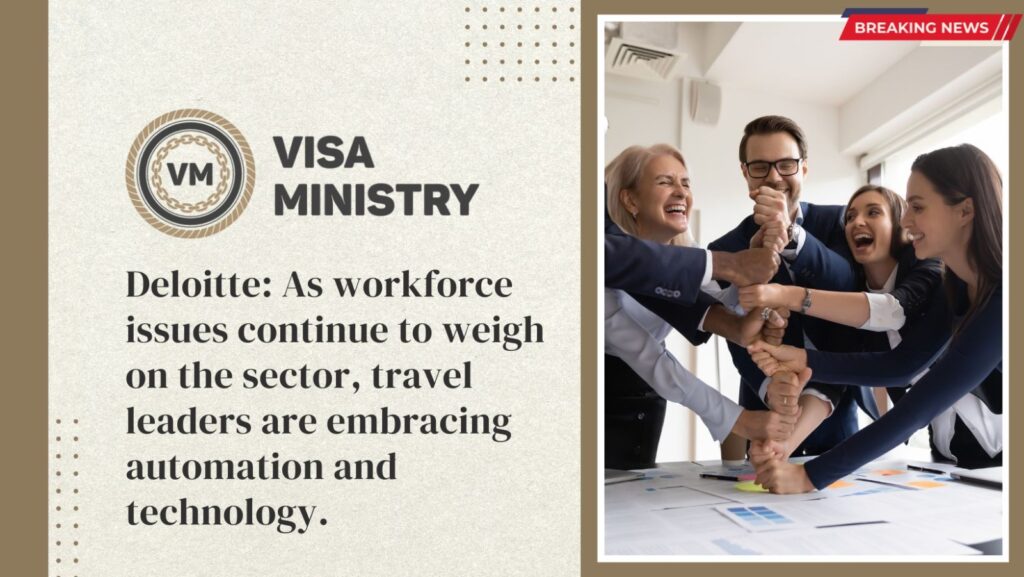Leaders in the airline and hospitality industries use digital and technological solutions to improve the traveler experience despite persisting labor challenges. The tourism sector continues to struggle with a scarcity of frontline employees even if air travel passenger volumes and hotel occupancy rates are recovering from pandemic lows. At the same time, the travel and working environments are expected to undergo a fundamental change due to a shift toward increasing automation and technology integration. “Toward Travel’s Frictionless Frontline: Integrating Technology and Workforce,” a new research from Deloitte, looks at how leaders in the airline and hotel industries are assessing investments in both technology and people to help have both an immediate and long-term impact.
To address labor issues, airline and hospitality businesses turn to technology.
Nearly two-thirds (62%) of aircraft respondents say their workforce is half or less of its pre-pandemic size, while more than half (53%) of hotel respondents say they are at or below 25-74% of their pre-pandemic employment. To overcome the issues of labor, leaders are turning to technology. Many anticipate that continuous developments in next-generation technologies, such as cloud computing and artificial intelligence (AI), will not only help address current labor difficulties but also boost performance within the next five years and foster competitive difference.
Although many do not anticipate a return to pre-pandemic levels any time soon, hotels and airports are confident that personnel numbers will continue to rise. Less than one in ten predict staffing levels to match those of 2019 by the end of 2023, and just 38% of hotel managers and 3% of airport executives anticipate reaching such levels at any point in 2024.
Many people believe that technology will make work challenges easier. To close the labor gap, almost all airports (99%) are implementing new technology, improving their current technology (96%) or automating routine jobs (93%). The adoption of new technology (50%) and the automation of routine processes (43%) as well as the upgrading of current technology (39%) are techniques that hotels are also using, albeit at a lower rate.
Compared to 57% of hotels, seven out of ten surveyed airports invested in at least three new technology kinds, which is a difference that is probably caused by the way the two industries are organized.
Some business executives believe that the solutions available now are inadequate to meet pressing needs: Leading tech adopters in particular for the hotel sector were almost twice as likely (54%) than others (29%) to feel that current “technology is not advanced enough.”
The window of opportunity for frontline employees is still open.
As technology develops, it is crucial—and difficult—to guarantee that personnel have the abilities to function efficiently. While 51% of hotel executives report having trouble matching job requirements with worker skills, 71% of aviation executives report having trouble revamping their jobs to take use of new technology. Executives in the travel sector observe that these issues do, however, improve with time and the application of technology, along with other advantages like cost savings.
Leaders in the airport industry (57%) and the hotel industry (43%) expect automation to lower labor expenses.
Four in ten hotel general managers (GMs) and over half of airport managers (48%) list reskilling to handle the impact of technology as one of their top three workforce challenges, respectively.
Technology is enhancing hiring and training procedures, according to leaders. Almost two-thirds (62%) of hotels and nearly all airports (94%) claim to be expanding their usage of virtual reality for training.
Overall, the majority of poll participants expect automation will positively impact employment possibilities for workers (95% of airports and 64% of hotels) and workplace conditions (88% of airports and 58% of hotels).
The promise of automation for the visitor experience
Staffing issues had an impact on both the passenger experience and the experience of those working in the travel business. Leaders expect that closing the labor gap will also improve client experiences by giving gate agents and hotel restaurant managers the chance to adjust their workdays.
Travelers’ experiences were impacted by labor issues: in reaction to staffing shortages, 84% of airport respondents and 70% of hotel respondents cut or removed facilities and services.
The majority of airports (90%) offer self-service options to visitors, whereas only 36% of hotels do the same.
The predicted impact of automation on visitors and passengers inspires leaders. 60% of hotel leaders and 72% of airport leaders expect automation to enhance the guest experience.
In particular, the ability of AI to enhance traveler experiences at airports makes it stand out. They anticipate that it will increase customer experience (98%), strengthen tailored suggestions and services (100%), and enhance visitor processing during the next five years.
In contrast, hotels believe that over the next five years, cloud computing will be most valuable for processing guests (29%), handling reservations (26%), and providing personalized recommendations and services (23%).
“For the past few years, travel leaders have struggled with workforce shortages and other pressing issues. Automation’s and other emerging technologies’ quick rise offers a chance to address this disruption while preserving the importance of the travel experience. Companies that make investments in both the technology and the people who use it, ensuring that staff members have the necessary tools and training, should be in a good position to manage the changing industry dynamics and to take advantage of unheard-of growth opportunities. said Danielle Hawkins, principal of Deloitte Consulting LLP and head of human resources for the travel, hotel, and services industries.
Based on a poll of 240 travel executives in the United States (120 airport managers and 120 hotel general managers), “Toward A Frictionless Frontline” was conducted from July 12 to August 7, 2023. Executive interviews with top hotel chains and airlines provided additional direction for the study.
Source- Travel daily

